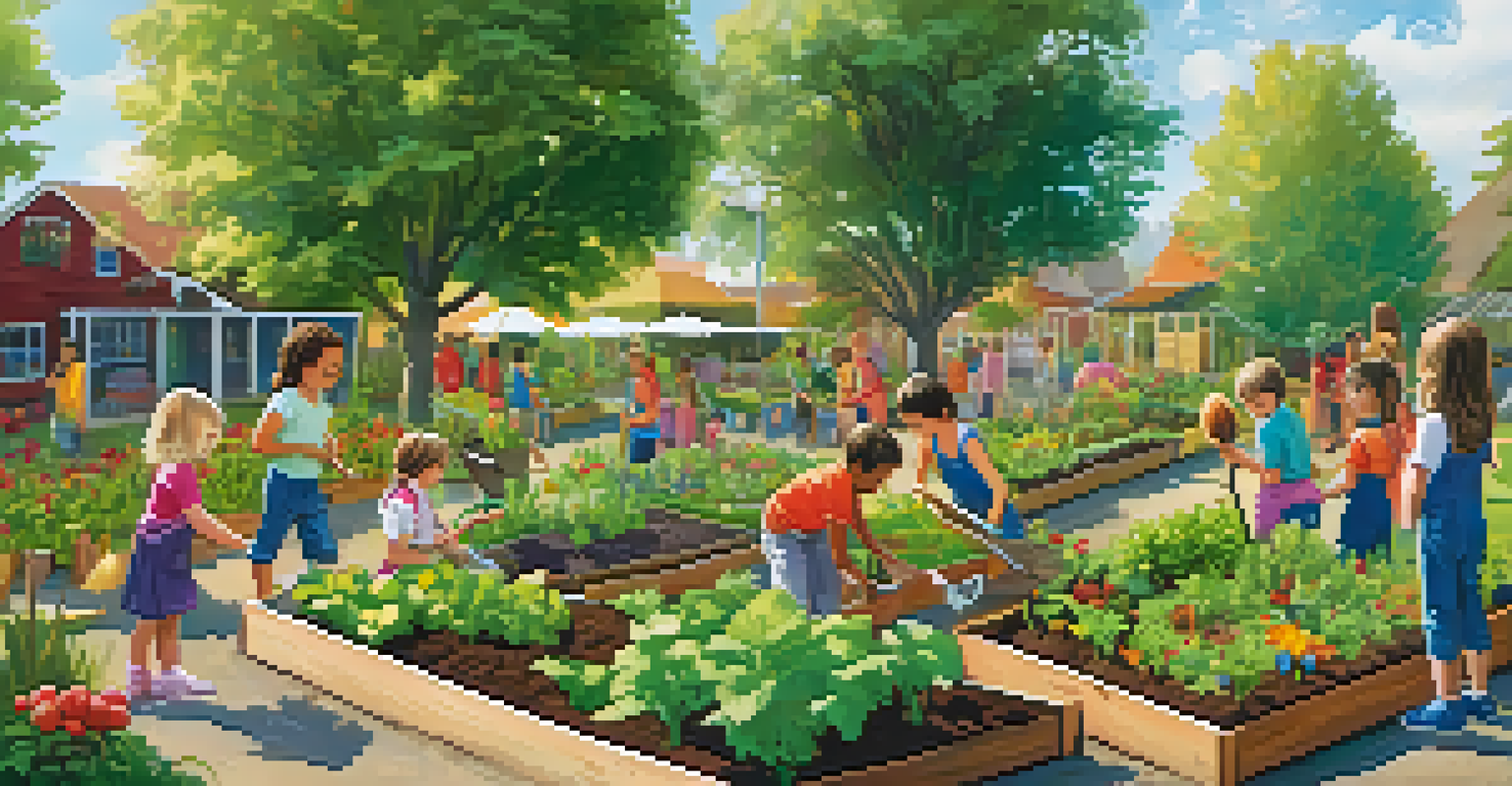The Importance of Nutritional Education for Children

Understanding Nutritional Education and Its Benefits
Nutritional education teaches children about the importance of food choices. It helps them understand how different foods affect their bodies and overall health. By learning about nutrition, children can develop lifelong habits that promote well-being.
Let food be thy medicine and medicine be thy food.
When children grasp the basics of nutrition, they are more likely to make healthier eating decisions. This education can reduce the risk of obesity and related health issues, such as diabetes and heart disease. Educated children are also more likely to choose fruits and vegetables over sugary snacks.
Furthermore, nutritional education encourages curiosity about food. Children often enjoy experimenting with different ingredients and recipes, which can lead to healthier eating habits at home. This fun exploration can foster a positive relationship with food.
The Role of Parents in Nutritional Education
Parents play a vital role in their children's nutritional education. They can model healthy eating behaviors by preparing nutritious meals and snacks at home. When children see their parents making healthy choices, they are more likely to mimic those behaviors.

Involving children in meal planning and cooking can also enhance their understanding of nutrition. By teaching them how to read food labels or choose wholesome ingredients, parents empower their children to make informed decisions. This hands-on approach transforms learning into a fun family activity.
Additionally, parents can reinforce nutritional concepts by discussing food choices during grocery shopping or dining out. These conversations help children connect their classroom lessons to real-life situations, solidifying their understanding of healthy eating.
Schools as Key Players in Nutritional Education
Schools have an essential responsibility in providing nutritional education. By incorporating nutrition lessons into the curriculum, educators can instill valuable knowledge in students. School programs can teach children about balanced diets and the importance of various food groups.
Nutrition is not just about eating. It's about learning to live.
Many schools also offer healthy meal options, which further reinforces the importance of nutrition. When children are served nutritious meals at school, they learn to appreciate healthy foods. This exposure can influence their preferences and choices outside of school.
Moreover, schools can partner with local farms and organizations to promote healthy eating. Field trips to farms or community gardens can provide hands-on experiences that enhance classroom learning. These initiatives create a supportive environment for children to explore food and nutrition.
The Impact of Technology on Nutritional Education
In today's digital age, technology plays a significant role in nutritional education. There are numerous apps and websites dedicated to teaching children about healthy eating. These tools make learning about nutrition interactive and appealing for tech-savvy kids.
Games and quizzes focused on nutrition can engage children in a fun way. By turning learning into a game, children are more likely to retain information and apply it in their daily lives. This approach makes nutrition education enjoyable and memorable.
Additionally, online resources can help parents and educators stay informed about the latest nutritional guidelines. Access to reliable information can enhance their ability to teach children about healthy eating. This collaboration between technology and education can lead to more successful outcomes.
Addressing Cultural Influences on Nutritional Choices
Cultural backgrounds significantly influence children's food choices. Nutritional education should respect and incorporate diverse culinary traditions. By acknowledging these influences, educators can create more relatable and effective lessons for children.
Teaching children about nutrition through the lens of their cultural heritage can foster a positive learning environment. It encourages children to appreciate their own traditions while also exploring new foods. This approach promotes inclusivity and understanding in the classroom.
Moreover, discussing cultural foods can spark curiosity and creativity in children. They may become interested in trying new recipes or learning about the nutritional benefits of their favorite dishes. This exploration can lead to a broader understanding of nutrition.
The Long-Term Benefits of Nutritional Education
Investing in nutritional education yields long-term benefits for children. When children learn about healthy eating, they are more likely to carry these habits into adulthood. This foundation can lead to healthier lifestyles and reduced healthcare costs in the future.
Additionally, nutritional education can positively affect academic performance. Studies suggest that children who eat a balanced diet tend to perform better in school. Proper nutrition fuels their brains, improving focus and cognitive function.
Finally, individuals with a strong understanding of nutrition are often more proactive about their health. They are equipped to make informed decisions, reduce the risk of chronic diseases, and promote overall well-being. This empowerment can lead to healthier communities.
Promoting Community Involvement in Nutritional Education
Community involvement is crucial for effective nutritional education. Local organizations can provide resources, workshops, and events that promote healthy eating. Engaging the community fosters a supportive network for children and their families.
Farmers' markets, cooking classes, and nutrition workshops are excellent ways to encourage healthy habits. These initiatives allow families to learn together, creating a sense of community around nutrition. Such connections can inspire individuals to make healthier choices.

Furthermore, community gardens can serve as valuable educational tools. Children can learn about growing their own food while understanding the importance of fresh produce. This hands-on experience fosters a deeper appreciation for nutrition and sustainability.